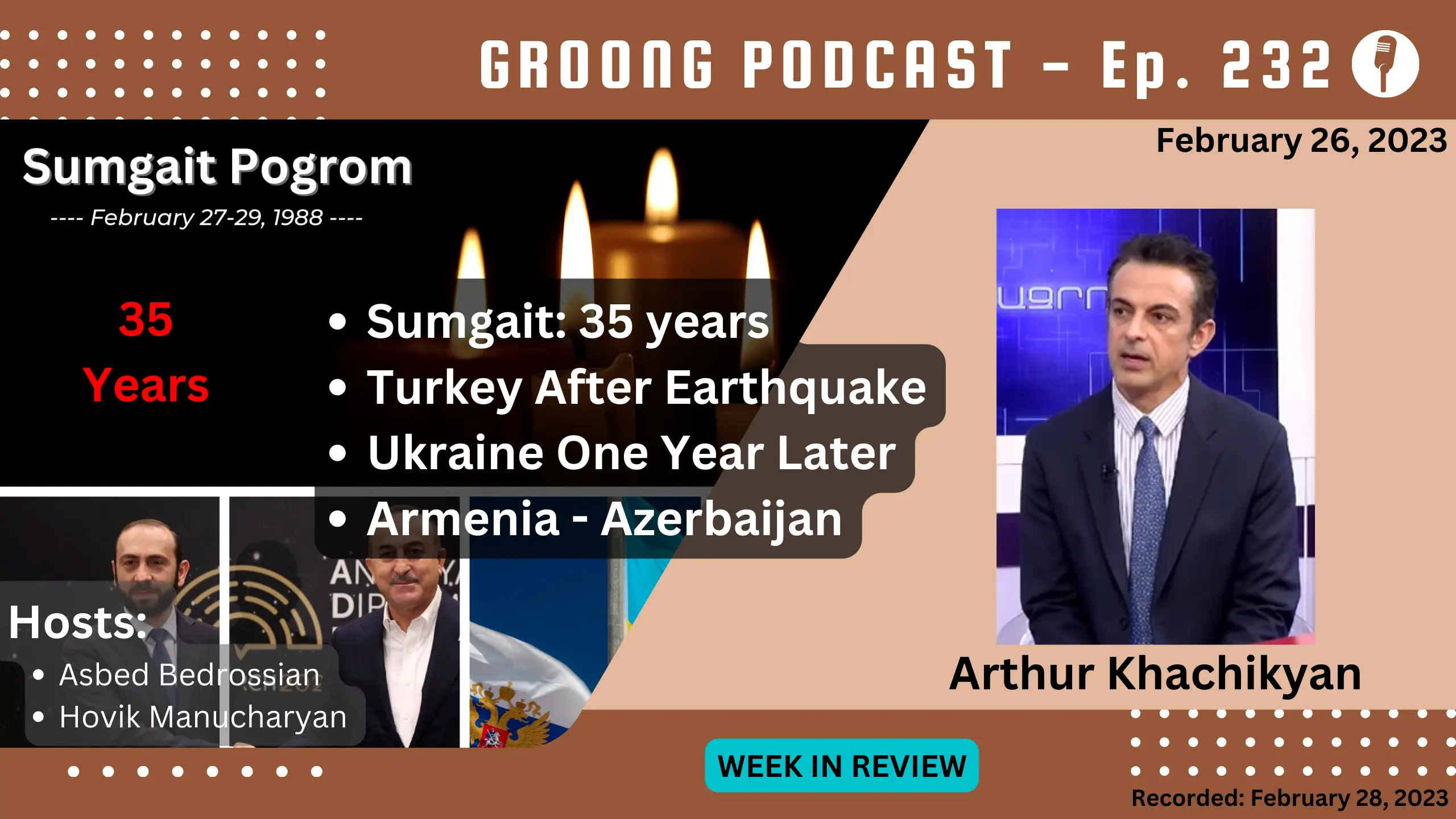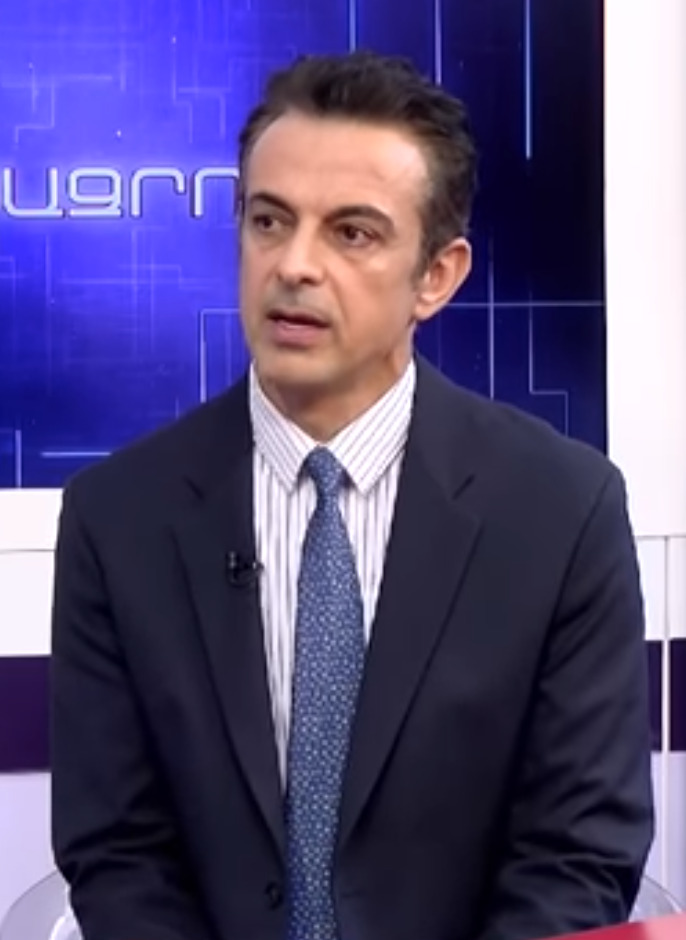
Guest:
Topics:
- 35th Anniversary of the Sumgait Pogroms
- Turkey after the Earthquake
- One Year Anniversary of the War in Ukraine
- Azerbaijan-Armenian Negotiations Continue
- Personal topics
Episode 232 | Recorded: February 28, 2023
Show Notes
35th Anniversary of the Sumgait Pogroms
Yesterday and today mark the 35th anniversary of the pogroms in Sumgait. Between February 27-29, 1988, the calls of Armenians in Karabakh for reunification with Armenia, which occurred earlier that month were met with brutal murder, violence, and plunder in Sumgait. More than 200 Armenians were killed, and Sumgait was eventually cleansed of its Armenian population. The organizers have not been punished and the real number of victims is unknown due to cover-up by Baku. This was the beginning of the complete annihilation of Armenian communities throughout Azerbaijan. Today a community estimated at over 250,000 Armenians in the Baku and Sumgait areas is gone, wiped out. Who remembers the Armenians of Azerbaijan?
Turkey after the Earthquake
Three weeks ago, a 7.8 magnitude earthquake struck Turkey and Syria. The death toll in Turkey is around 45,000 people while in Syria it’s around 6,000. There are many Armenians among the casualties.
Armenia also dispatched rescuers to both Syria and Turkey, and the border with Turkey was opened twice to let through convoys of trucks carrying Armenian aid to the distressed areas.
We’ve already discussed the debate that ensued within Armenian politics regarding this aid and its aims. Today let’s to focus more on Turkey’s situation and how that affects us.
Questions:
- Does this earthquake shift Turkey’s attention from regional, Pan-Turkic, expansive policies for a time being?
- Do the economics of the earthquake cause Turkey to take pause from encouraging Azerbaijan from maximalist positions, for example in pushing for a so-called “Zangezur corridor”, or assimilating Artsakh?
- Will it pause from backing terrorists in the north of Syria?
Prior to the Earthquake, Erdogan was busy ensuring his reelection in the May Presidential elections.
Questions:
- How is the earthquake affecting Erdogan’s hold on power, and does it shuffle the deck on the May presidential elections?
- Has it weakened Erdogan vis-à-vis Putin?
In the current phase of Turkish-Armenian so-called “Normalization”:
Question:
- What are the premises based upon which the Pashinyan government has engaged to “normalize”?
Ukraine: One Year Later
A few days ago marked the one year anniversary of the war in Ukraine. It started as a “special operation” which should have lasted a couple of weeks, but here we are a year later. The special operation has become a Russia vs the West proxy war on the territory of Ukraine, and it could easily explode into a wider, multi-front global disaster.
Question:
- Who’s winning the Ukraine war?
Putin’s speech
Just before this anniversary Putin gave a “state of the country” address. In general it seems like Putin kept the west surprised.
- Putin suspended Russia’s participation in the START nuclear treaties.
- Putin rescinded the national security strategy document of Russia, which talked about Moldova (and its territorial integrity) as well as Russia’s participation in the OSCE Minsk Group.
Questions:
- What is your assessment of Putin’s address?
- Was this the “official” end of the OSCE MG?
- What is the role of China in this conflict? Is this still a proxy war between Russia and the West, or is China and the West?
Azerbaijan Armenia Negotiations
Last weekend Pashinyan attended the Annual Munich Security Conference. There was a public panel full of embarrassing scenes of Aliyev calling Pashinyan and Armenians “occupiers” and “capitulants”, of course with no response.
Since then the west has upped the intensity, pushing Armenia to sign Aliyev’s “peace treaty”. Some elements of this were leaked by Ashotyan, who showed a document that claimed he is 100% sure is genuine, which reconfirms that what is being negotiated is some form of guarantees of Armenians of Artsakh within the borders of Azerbaijan. Anthony Blinken has said that there will be a meeting in Brussels in the coming days.
Questions:
- Do you expect an agreement to be signed soon? Is Brussels where the treaty is going to be signed?
- Is this a final goodbye to Moscow? What consequences can be expected?
In his recent interview just before the weekend, Security Council chair Armen Grigoryan repeated Nikol’s claim that EU monitors are here to keep watch on Russians, and denied that they “negotiated” with the Ashotyan document, referring to the document disclosed by Ashotyan.
Question:
- When Pashinyan said the statement about keeping tabs on Russians, many of our guests declined to comment on it, writing it off as unprofessionalism or being emotional. But now, it appears that this messaging is coordinated. What does Armenian leadership want to get by this messaging?
Aliyev visit to Turkey
Aliyev visited Turkey last week. After the disastrous earthquake there, given the closeness of the countries, an official visit from Aliyev was expected to happen quickly and delays in the visit raised questions. Official reports about the meeting were sparse, however, there were reports that Armenian-Azerbaijani relations were also a topic of discussion.
Question:
- Turkey has multiple times said that relations with Armenia are conditional upon Armenia’s relations and establishment of so-called “peace” with Azerbaijan. However, some speculate that official Baku is not pleased with the recent sweet talk between Chavushoglu and Mirzoyan. How much credence should we give to such reports?
Lavrov Visits Baku
Lavrov visited Baku today. Media reported that “special attention will be paid to the implementation of trilateral agreements between the leaders of Russia, Azerbaijan and Armenia”.
The meeting comes right after the fact that the Baku-Ceyhan pipeline is no longer carrying any Russian oil due to Western sanctions.
In an announcement, Lavrov mentioned that having a passport control checkpoint on the Lachin/Berdzor corridor was not envisaged by the November 9/10 declaration, however, at the same time he said that military cargo was also not envisaged. Lavrov spoke about using technology to address this problem.
Questions:
- What do you think is going on between Azerbaijan and Russia?
- There have been rumors that the Lachin/Berdzor corridor will reopen soon,
ICJ Ruling
Last week the ICJ partially ruled in favor of Armenia in response to Armenia’s request. Armenia had made 3 requests in its appeal:
- To take all measures in its disposal to unblock the Berdzor corridor
- Court granted this request.
- To cease orchestration and support of the “protesters” 2. Court said this was not necessary, and that peaceful assembly and protest was a protected act by CERD itself.
- To fully restore and refrain from interrupting gas flows and electricity supplies to Artsakh from Armenia 3. Court said there was “not enough evidence” that Azerbaijan is involved in this.
UN Secretary General Guterrez calls the ICJ ruling “binding”, and the EU notes this as well. But Azerbaijan has yet to make any changes in its m.o. regarding the Artskah Blockade.
Question:
- What does “binding” mean? Who will enforce this ruling?
Developments in Artsakh
Through all this of course the Artsakh Blockade has continued, this was day 79. Of course we are aware that on Thursday Artsakh president Arayik Harutyunyan sacked state minister Ruben Vardanyan. Both Aliyev and Pashinyan had been calling for his ouster.
Questions:
- What are your thoughts about these developments?
- Does this leave Artsakh stronger or weaker in its ramping negotiations with Azerbaijan?
- What will be the agenda of Artsakh-Azerbaijan negotiations?
Alright, let’s wrap up our topics here. I’d like to ask each of you if there’s been something on your mind this past week that you want to talk about.
Topics from the Panelists
- Hovik - Cultural Appropriation - the NY Metropolitan Museum reclassifying Ivan Aivazovsky as a “Ukrainian”.
- Arthur - Mass Hypnotism and Consumerism consuming Armenia.
Wrap-up
We hope you found our Week in Review helpful. We invite your feedback and your suggestions, you can find us on most social media and podcast platforms. Thanks to Laura Osborn for the music on our podcasts.
Guests

Arthur Khachikyan
Dr. Arthur Khachikyan, an International Relations expert from Stanford University, specializing in intervention.
Hosts

Hovik Manucharyan
Hovik Manucharyan is an information security engineer who moved from Seattle to Armenia in 2022. He co-founded the ANN/Groong podcast in 2020 and has been a contributor to Groong News since the late 1990s.
Disclaimer: The views expressed by Hovik Manucharyan on the ANN/Groong podcast are his own and do not necessarily reflect the opinions of his employer or any other organization.

Asbed Bedrossian
Asbed Bedrossian is an IT professional, and for years oversaw the central IT enterprise infrastructure and services at USC. His decades of experience spanned across IT strategy, enterprise architecture, infrastructure, cybersecurity, enterprise applications, data center operations, high performance computing, ITSM, ITPM, and more.
Asbed founded the Armenian News Network Groong circa 1989/1990, and co-founded the ANN/Groong podcast in 2020.